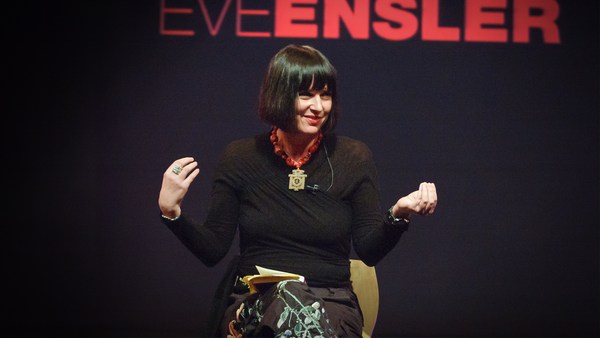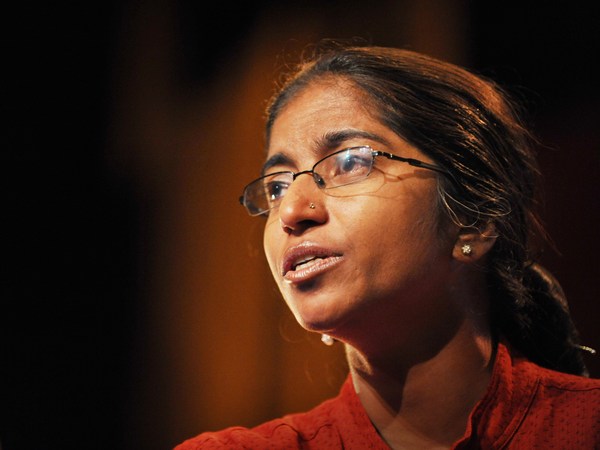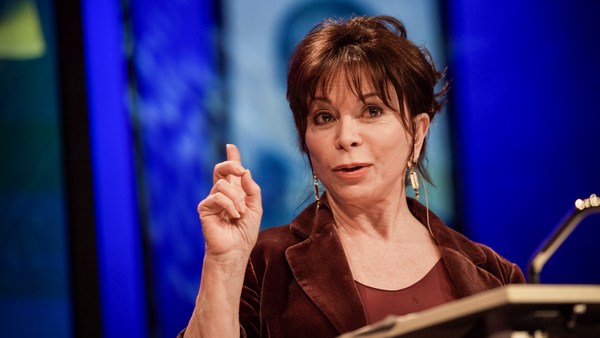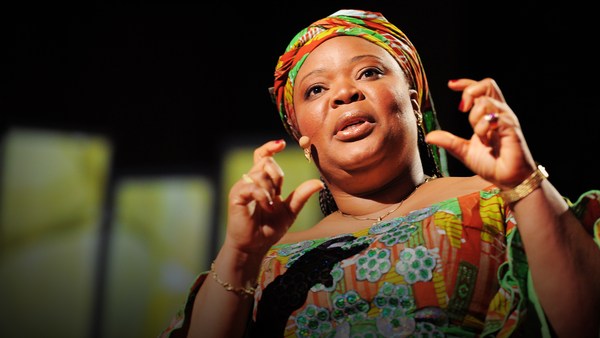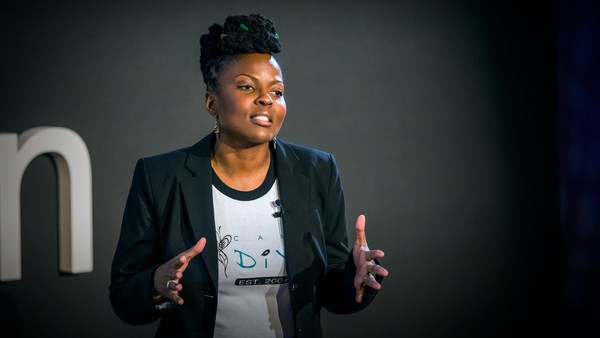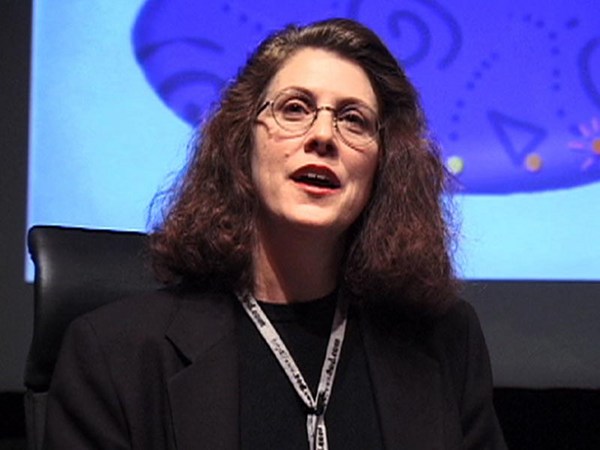Namaste. Good morning. I'm very happy to be here in India. And I've been thinking a lot about what I have learned over these last particularly 11 years with V-Day and "The Vagina Monologues," traveling the world, essentially meeting with women and girls across the planet to stop violence against women.
What I want to talk about today is this particular cell, or grouping of cells, that is in each and every one of us. And I want to call it the girl cell. And it's in men as well as in women. I want you to imagine that this particular grouping of cells is central to the evolution of our species and the continuation of the human race.
And I want you imagine that at some point in history a group of powerful people invested in owning and controlling the world understood that the suppression of this particular cell, the oppression of these cells, the reinterpretation of these cells, the undermining of these cells, getting us to believe in the weakness of these cells and the crushing, eradicating, destroying, reducing these cells, basically began the process of killing off the girl cell, which was, by the way, patriarchy.
I want you to imagine that the girl is a chip in the huge macrocosm of collective consciousness. And it is essential to balance, to wisdom and to actually the future of all of us. And then I want you to imagine that this girl cell is compassion, and it's empathy, and it's passion itself, and it's vulnerability, and it's openness, and it's intensity, and it's association, and it's relationship, and it is intuitive.
And then let's think how compassion informs wisdom, and that vulnerability is our greatest strength, and that emotions have inherent logic, which lead to radical, appropriate, saving action. And then let's remember that we've been taught the exact opposite by the powers that be, that compassion clouds your thinking, that it gets in the way, that vulnerability is weakness, that emotions are not to be trusted, and you're not supposed to take things personally, which is one of my favorites.
I think the whole world has essentially been brought up not to be a girl. How do we bring up boys? What does it mean to be a boy? To be a boy really means not to be a girl. To be a man means not to be a girl. To be a woman means not to be a girl. To be strong means not to be a girl. To be a leader means not to be a girl. I actually think that being a girl is so powerful that we've had to train everyone not to be that. (Laughter)
And I'd also like to say that the irony of course, is that denying girl, suppressing girl, suppressing emotion, refusing feeling has lead thus here. Where we have now come to live in a world where the most extreme forms of violence, the most horrific poverty, genocide, mass rapes, the destruction of the Earth, is completely out of control. And because we have suppressed our girl cells and suppressed our girl-ship, we do not feel what is going on.
So, we are not being charged with the adequate response to what is happening. I want to talk a little bit about the Democratic Republic of Congo. For me, it was the turning point of my life. I have spent a lot of time there in the last three years. I feel up to that point I had seen a lot in the world, a lot of violence.
I essentially lived in the rape mines of the world for the last 12 years. But the Democratic Republic of Congo really was the turning point in my soul. I went and I spent time in a place called Bukavu in a hospital called the Panzi Hospital, with a doctor who was as close to a saint as any person I've ever met. His name is Dr. Denis Mukwege. In the Congo, for those of you who don't know, there has been a war raging for the last 12 years, a war that has killed nearly six million people. It is estimated that somewhere between 300,000 and 500,000 women have been raped there.
When I spent my first weeks at Panzi hospital I sat with women who sat and lined up every day to tell me their stories. Their stories were so horrific, and so mind-blowing and so on the other side of human existence, that to be perfectly honest with you, I was shattered. And I will tell you that what happened is through that shattering, listening to the stories of eight-year-old girls who had their insides eviscerated, who had guns and bayonets and things shoved inside them so they had holes, literally, inside them where their pee and poop came out of them.
Listening to the story of 80-year-old women who were tied to chains and circled, and where groups of men would come and rape them periodically, all in the name of economic exploitation to steal the minerals so the West can have it and profit from them. My mind was so shattered.
But what happened for me is that that shattering actually emboldened me in a way I have never been emboldened. That shattering, that opening of my girl cell, that kind of massive breakthrough of my heart allowed me to become more courageous, and braver, and actually more clever than I had been in the past in my life.
I want to say that I think the powers that be know that empire-building is actually -- that feelings get in the way of empire-building. Feelings get in the way of the mass acquisition of the Earth, and excavating the Earth, and destroying things. I remember, for example, when my father, who was very, very violent, used to beat me. And he would actually say, while he was beating me, "Don't you cry. Don't you dare cry." Because my crying somehow exposed his brutality to him. And even in the moment he didn't want to be reminded of what he was doing.
I know that we have systematically annihilated the girl cell. And I want to say we've annihilated it in men as well as in women. And I think in some ways we've been much harsher to men in the annihilation of their girl cell. (Applause) I see how boys have been brought up, and I see this across the planet: to be tough, to be hardened, to distance themselves from their tenderness, to not cry. I actually realized once in Kosovo, when I watched a man break down, that bullets are actually hardened tears, that when we don't allow men to have their girl self and have their vulnerability, and have their compassion, and have their hearts, that they become hardened and hurtful and violent.
And I think we have taught men to be secure when they are insecure, to pretend they know things when they don't know things, or why would we be where we are? To pretend they're not a mess when they are a mess. And I will tell you a very funny story. On my way here on the airplane, I was walking up and down the aisle of the plane. And all these men, literally at least 10 men, were in their little seats watching chick flicks. And they were all alone, and I thought, "This is the secret life of men." (Laughter)
I've traveled, as I said, to many, many countries, and I've seen, if we do what we do to the girl inside us then obviously it's horrific to think what we do to girls in the world. And we heard from Sunitha yesterday, and Kavita about what we do to girls. But I just want to say that I've met girls with knife wounds and cigarette burns, who are literally being treated like ashtrays. I've seen girls be treated like garbage cans. I've seen girls who were beaten by their mothers and brothers and fathers and uncles. I've seen girls starving themselves to death in America in institutions to look like some idealized version of themselves.
I've seen that we cut girls and we control them and we keep them illiterate, or we make them feel bad about being too smart. We silence them. We make them feel guilty for being smart. We get them to behave, to tone it down, not to be too intense. We sell them, we kill them as embryos, we enslave them, we rape them. We are so accustomed to robbing girls of the subject of being the subjects of their lives that we have now actually objectified them and turned them into commodities.
The selling of girls is rampant across the planet. And in many places they are worth less than goats and cows. But I also want to talk about the fact that if one in eight people on the planet are girls between the ages of 10 to 24, they are they key, really, in the developing world, as well as in the whole world, to the future of humanity. And if girls are in trouble because they face systematic disadvantages that keep them where society wants them to be, including lack of access to healthcare, education, healthy foods, labor force participation. The burden of all the household tasks usually falls on girls and younger siblings, which ensures that they will never overcome these barriers.
The state of girls, the condition of girls, will, in my belief -- and that's the girl inside us and the girl in the world -- determine whether the species survives. And what I want to suggest is that, having talked to girls, because I just finished a new book called "I Am an Emotional Creature: The Secret Life of Girls Around the World," I've been talking to girls for five years, and one of the things that I've seen is true everywhere is that the verb that's been enforced on girl is the verb "to please." Girls are trained to please. I want to change the verb. I want us all to change the verb. I want the verb to be "educate," or "activate," or "engage," or "confront," or "defy," or "create." If we teach girls to change the verb we will actually enforce the girl inside us and the girl inside them.
And I have to now share a few stories of girls I've seen across the planet who have engaged their girl, who have taken on their girl in spite of all the circumstances around them. I know a 14-year-old girl in the Netherlands, for example, who is demanding that she take a boat and go around the entire world by herself.
There is a teenage girl who just recently went out and knew that she needed 56 stars tattooed on the right side of her face.
There is a girl, Julia Butterfly Hill, who lived for a year in a tree because she wanted to protect the wild oaks.
There is a girl who I met 14 years ago in Afghanistan who I have adopted as my daughter because her mother was killed. Her mother was a revolutionary. And this girl, when she was 17 years old, wore a burqa in Afghanistan, and went into the stadiums and documented the atrocities that were going on towards women, underneath her burqa, with a video. And that video became the video that went out all over the world after 9/11 to show what was going on in Afghanistan.
I want to talk about Rachel Corrie who was in her teens when she stood in front of an Israeli tank to say, "End the occupation." And she knew she risked death and she was literally gunned down and rolled over by that tank.
And I want to talk about a girl that I just met recently in Bukavu, who was impregnated by her rapist. And she was holding her baby. And I asked her if she loved her baby. And she looked into her baby's eyes and she said, "Of course I love my baby. How could I not love my baby? It's my baby and it's full of love."
The capacity for girls to overcome situations and to move on levels, to me, is mind-blowing. There is a girl named Dorcas, and I just met her in Kenya. Dorcas is 15 years old, and she was trained in self-defense. A few months ago she was picked up on the street by three older men. They kidnapped her, they put her in a car. And through her self-defense, she grabbed their Adam's apples, she punched them in the eyes and she got herself free and out of the car.
In Kenya, in August, I went to visit one of the V-Day safe houses for girls, a house we opened seven years ago with an amazing woman named Agnes Pareyio. Agnes was a woman who was cut when she was a little girl, she was female genitally mutilated. And she made a decision as many women do across this planet, that what was done to her would not be enforced and done to other women and girls.
So, for years Agnes walked through the Rift valley. She taught girls what a healthy vagina looked like, and what a mutilated vagina looked like. And in that time she saved many girls. And when we met her we asked her what we could do for her, and she said, "Well, if you got me a Jeep I could get around a lot faster." So, we got her a Jeep. And then she saved 4,500 girls.
And then we asked her, "Okay, what else do you need?" And she said, "Well, now, I need a house." So, seven years ago Agnes built the first V-Day safe house in Narok, Kenya, in the Masai land. And it was a house where girls could run away, they could save their clitoris, they wouldn't be cut, they could go to school. And in the years that Agnes has had the house, she has changed the situation there. She has literally become deputy mayor. She's changed the rules. The whole community has bought in to what she's doing.
When we were there she was doing a ritual where she reconciles girls, who have run away, with their families. And there was a young girl named Jaclyn. Jaclyn was 14 years old and she was in her Masai family and there's a drought in Kenya. So cows are dying, and cows are the most valued possession. And Jaclyn overheard her father talking to an old man about how he was about to sell her for the cows. And she knew that meant she would be cut. She knew that meant she wouldn't go to school. She knew that meant she wouldn't have a future. She knew she would have to marry that old man, and she was 14.
So, one afternoon, she'd heard about the safe house, Jaclyn left her father's house and she walked for two days, two days through Masai land. She slept with the hyenas. She hid at night. She imagined her father killing her on one hand, and Mama Agnes greeting her, with the hope that she would greet her when she got to the house. And when she got to the house she was greeted. Agnes took her in, and Agnes loved her, and Agnes supported her for the year. She went to school and she found her voice, and she found her identity, and she found her heart.
Then, her time was ready when she had to go back to talk to her father about the reconciliation, after a year. I had the privilege of being in the hut when she was reunited with her father and reconciled. In that hut, we walked in, and her father and his four wives were sitting there, and her sisters who had just returned because they had all fled when she had fled, and her primary mother, who had been beaten in standing up for her with the elders. When her father saw her and saw who she had become, in her full girl self, he threw his arms around her and broke down crying. He said, "You are beautiful. You have grown into a gorgeous woman. We will not cut you. And I give you my word, here and now, that we will not cut your sisters either."
And what she said to him was, "You were willing to sell me for four cows, and a calf and some blankets. But I promise you, now that I will be educated I will always take care of you, and I will come back and I will build you a house. And I will be in your corner for the rest of your life."
For me, that is the power of girls. And that is the power of transformation. I want to close today with a new piece from my book. And I want to do it tonight for the girl in everybody here. And I want to do it for Sunitha. And I want to do it for the girls that Sunitha talked about yesterday, the girls who survive, the girls who can become somebody else. But I really want to do it for each and every person here, to value the girl in us, to value the part that cries, to value the part that's emotional, to value the part that's vulnerable, to understand that's where the future lies.
This is called "I'm An Emotional Creature." And it happened because I met a girl in Watts, L.A. I was asking girls if they like being a girl, and all the girls were like, "No, I hate it. I can't stand it. It's all bad. My brothers get everything." And this girl just sat up and went, "I love being a girl. I'm an emotional creature!" (Laughter) This is for her:
I love being a girl. I can feel what you're feeling as you're feeling inside the feeling before. I am an emotional creature. Things do not come to me as intellectual theories or hard-pressed ideas. They pulse through my organs and legs and burn up my ears. Oh, I know when your girlfriend's really pissed off, even though she appears to give you what you want. I know when a storm is coming. I can feel the invisible stirrings in the air. I can tell you he won't call back. It's a vibe I share.
I am an emotional creature. I love that I do not take things lightly. Everything is intense to me, the way I walk in the street, the way my momma wakes me up, the way it's unbearable when I lose, the way I hear bad news.
I am an emotional creature. I am connected to everything and everyone. I was born like that. Don't you say all negative that it's only only a teenage thing, or it's only because I'm a girl. These feelings make me better. They make me present. They make me ready. They make me strong.
I am an emotional creature. There is a particular way of knowing. It's like the older women somehow forgot. I rejoice that it's still in my body. Oh, I know when the coconut's about to fall. I know we have pushed the Earth too far. I know my father isn't coming back, and that no one's prepared for the fire. I know that lipstick means more than show, and boys are super insecure, and so-called terrorists are made, not born. I know that one kiss could take away all my decision-making ability. (Laughter) And you know what? Sometimes it should. This is not extreme. It's a girl thing, what we would all be if the big door inside us flew open.
Don't tell me not to cry, to calm it down, not to be so extreme, to be reasonable. I am an emotional creature. It's how the earth got made, how the wind continues to pollinate. You don't tell the Atlantic Ocean to behave. I am an emotional creature. Why would you want to shut me down or turn me off? I am your remaining memory. I can take you back. Nothing's been diluted. Nothing's leaked out. I love, hear me, I love that I can feel the feelings inside you, even if they stop my life, even if they break my heart, even if they take me off track, they make me responsible.
I am an emotional, I am an emotional, incondotional, devotional creature. And I love, hear me, I love, love, love being a girl. Can you say it with me? I love, I love, love, love being a girl! Thank you very much. (Applause)
